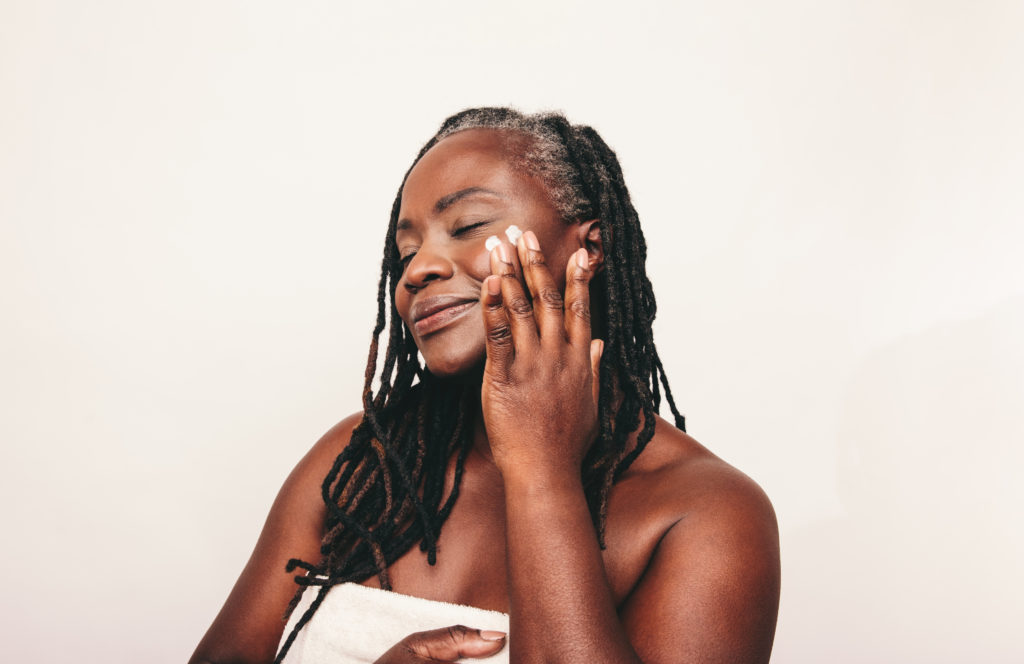Wrinkles, age spots, and dryness — oh, my! When signs of age begin to appear on your skin, it can feel like a harsh wake-up call. But you’re definitely not alone: Most women experience changes in their skin after 40. Hormonal changes can bring on dryness, redness, sensitivity, even acne. With so many products on the market, it can be tough to know what skin care regimen is right for you. We’ve lent you a hand by narrowing down the most effective anti-aging skin care ingredients your money can buy.
Powerhouse Anti-Aging Skin Care Ingredients
Hyaluronic acid
Use it for: Dryness, wrinkles
What it does: Hyaluronic acid is trending as an ultra-effective skin care ingredient, but it’s nothing new. Hyaluronic acid occurs naturally in our bodies, with the highest concentration in our eyes and joints. Applied topically, hyaluronic acid helps maintain and lock in moisture. The result is hydrated, plump, healthy skin.
How to use it: You can find hyaluronic acid in a wide variety of skin care products, from serums to moisturizers. It’s great for any skin type, particularly wrinkle-prone skin, and it’s safe to use as part of your regular skin care routine. If your skin is on the dry side, you could opt to use multiple products containing hyaluronic acid — serum, moisturizer, foundation, and so on.
Retinol
Use it for: Hyperpigmentation, wrinkles, acne
What it does: The real question is, what doesn’t retinol do? Retinol is a powerful anti-aging skin care ingredient that can brighten dark spots from sun damage, reduce wrinkles, and even fight acne (which — surprise! — is a menopause symptom for many women). Both retinol and retinoids are derivatives of vitamin A, but retinol is gentler on the skin. Retinol is available over the counter, whereas retinoids (like Retin-A) are stronger and require a prescription.
How to use it: Retinol breaks down in the sun and can make your skin ultra sensitive, so you should apply it only at night. To add retinol to your nightly skin care routine, start with a gentle cleanser. After, apply a small amount of retinol. If it’s your first time, you may want to dilute it with a serum or moisturizer. Retinol can cause stinging or burning at first, so add it to your routine very gradually.
Vitamin C
Use it for: Hyperpigmentation, redness, wrinkle prevention
What it does: Aside from staving off a potential cold, vitamin C has a number of benefits. When applied topically, vitamin C can help reduce hyperpigmentation, reduce redness, and even prevent skin sagging. You’ll find it in a lot of skin-brightening products, thanks to its ability to impede melanin production and promote a more even-toned complexion.
How to use it: Though vitamin C is generally safe for most people, those with sensitive skin will want to ease it into their skin care routine. You might opt to use vitamin C in a serum and then follow with your regular moisturizer. Be aware that vitamin C does have a shelf life: If it turns brown, it has oxidized and may no longer be effective.
Hydroquinone
Use it for: Hyperpigmentation, acne scars
What it does: If you just can’t seem to get rid of your sun spots or acne scars, hydroquinone might be for you. It’s a powerful agent for anyone with hyperpigmentation, as it interferes with melanin production to even out your skin tone. You’ll find hydroquinone in high-end serums and moisturizers labeled “lightening” or “flash treatment.”
How to use it: Apply hydroquinone directly to your problem areas, but note that it’s typically very strong and can cause redness and burning to those with sensitive skin. You’ll want to double up on sunscreen when treating your skin with hydroquinone, since it can cause extra sensitivity. See your dermatologist if you don’t see any positive effect.
Niacinamide
Use it for: Hyperpigmentation, fine lines and wrinkles, uneven skin tone
What it does: Niacinamide is a B vitamin that, when applied topically, has been proven to have a number of benefits for aging skin. One study showed that women who used it for four weeks saw a reduction in fine lines and wrinkles, and improved hyperpigmentation, redness, and sallow skin.
How to use it: There are rumors that you can’t use niacinamide with vitamin C, and that simply isn’t true. In fact, the two ingredients complement each other, so it’s fine to use them together as part of your skin care routine. Of course, it’s always a good idea to ease into using any new product, especially if you have sensitive skin.
Get your best skin after 40
Aging can cause many unexpected changes in your skin. From age spots that appear suddenly overnight to vaginal dryness that few women talk about, shifting hormones can make it seem like your largest organ is suddenly your enemy. It’s not! Treat it well with the anti-aging skin care ingredients mentioned here.
To learn the truth about menopause and skin care, read 7 Myths About Menopause and Skin.
